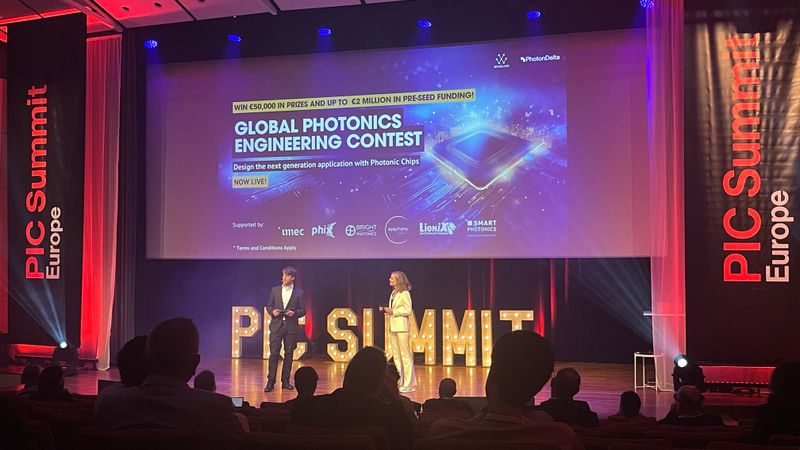The Future of Photonics: Global Engineering Challenge Officially Launced at PIC Summit 2024
Industry Leaders Emphasize the Role of Innovation and Cooperation in Developing Integrated Photonic Applications to Address Societal Challenges.
The future of photonic integrated circuits (PICs) is brighter than ever, and the Global Photonics Engineering Contest is set to drive this momentum forward. Hosted together by PhotonDelta and Wevolver, this contest calls on tech-savvy engineers and innovators to tackle the engineering challenges of tomorrow. Launched against the backdrop of this year’s PIC Summit, which saw over 700 industry leaders, including government officials, semiconductor experts, and photonics professionals to discuss the future of the photonic chip industry, the contest underscores the urgent need to advance photonic chip technologies to address critical societal challenges.
The Global Photonics Engineering Challenge: Driving Innovation
The Global Photonics Engineering Challenge is a pioneering contest that is shaping the future of photonic integrated circuit (PIC) engineering. Hosted by PhotonDelta, an industry accelerator of the development of the photonic chip ecosystem, and Wevolver, a platform dedicated to democratizing engineering innovation, the contest highlights the critical role photonics will play in the future of multiple industries. It is further supported by key actors in the integrated photonics industry: imec, PHIX Photonics Assembly, SMART Photonics, BRIGHT integrated Photonics, Epiphany, and LioniX International.
The challenge invites participants to design groundbreaking PIC-based solutions across a broad spectrum of industries, from telecommunications and medical devices to quantum computing and environmental monitoring. With the competition focusing on next-generation PICs, participants are encouraged to explore practical applications that could redefine the technological landscape.
Winners will not only gain €50,000 of services from the PhotonDelta ecosystem to make their idea market-ready and a chance to receive up to €2 million in pre-seed funding, but will also have the opportunity to get recognition among the global photonics community and collaborate with industry leaders to develop their idea.
The competition is open for applications from now until the 3rd of March for any one from startups, established companies, engineers, researchers, students, and academic organizations working on next-generation photonic circuits that tackle pressing societal challenges in areas such as sustainability, healthcare and climate change.
This challenge is more than a contest—it’s a way to help shape the future of technology, enabling engineers to demonstrate the potential of PICs in addressing critical societal and industrial challenges.
Why the Challenge Matters
This year's PIC Summit highlighted the need for innovation and collaboration to continue advancing the applications of integrated photonics, as it is rapidly becoming a critical component in many industries, thanks to its ability to provide ultra-fast data transmission, energy-efficient computing, and compact hardware. However, the design and integration of PICs remain complex. Engineers must overcome significant challenges related to fabrication, power consumption, and scalability. The Global Photonics Engineering Challenge serves as a platform for innovators to present creative solutions to these challenges while showcasing the untapped potential of photonic technologies.
For engineers, this challenge offers an opportunity to work on cutting-edge technology, collaborate with leading professionals, and contribute to transformative solutions. It highlights the critical role that PIC engineering plays in solving global problems and drives home the importance of continuing advancements in this field.
Key Highlights and Insights from PIC Summit 2024
The PIC Summit 2024 was a hub of cutting-edge discussions, bringing together over 700 leaders from governments, the semiconductor industry, and the photonic chip sector. The focus of the summit was to explore how photonics can drive the next wave of technological advancements. Leaders emphasized the need for greater European cooperation to remain competitive in the global market and stressed the importance of government support to fuel innovation.
Three Key Themes from This Year’s PIC Summit:
Industry Roadmaps and Trends: Discussions on the global photonics roadmap provided valuable insights into where the industry is headed. Experts delved into the latest advancements in materials, fabrication techniques, and applications that are driving the photonic sector forward.
The Role of Startups and SMEs: This year's PIC Summit highlighted the crucial role of small and medium-sized enterprises (SMEs) and startups in pushing the boundaries of PIC technology. The summit saw several sessions where start ups pitch their applications in biosensing, quantum computing and imaging.
Quantum Computing and Photonics: With the rise of quantum computing, photonics is being explored as a viable technology to enable the creation of quantum bits (qubits) at scale. Sessions dedicated to this topic revealed how photonics could overcome current quantum computing challenges, particularly in scaling and error correction.
Be a Part of The Future of Photonic Integrated Circuit Engineering: Apply to the Global Photonics Engineering Challenge
The PIC Summit 2024 and the Global Photonics Engineering Challenge represent a monumental shift in how the world views photonic integrated circuits. As governments, industries, and engineers come together to drive the next wave of photonic innovation, the future holds immense potential for transformative applications in a variety of fields.
For engineers, this is an exciting time. Whether you are involved in telecommunications, computing, healthcare, or environmental technologies, photonic integrated circuits are set to change the game. The Global Photonics Engineering Challenge offers a unique opportunity to contribute to this revolution while gaining recognition in an industry that is poised for exponential growth.

